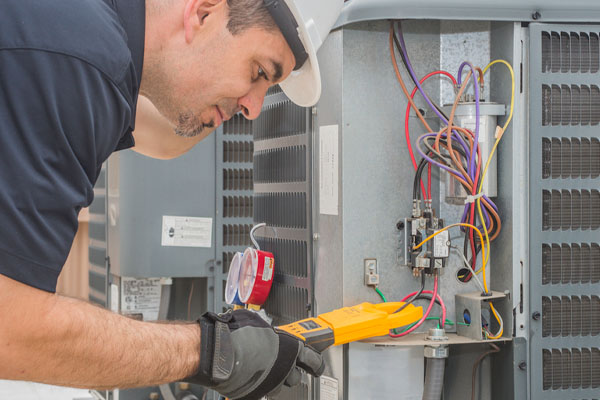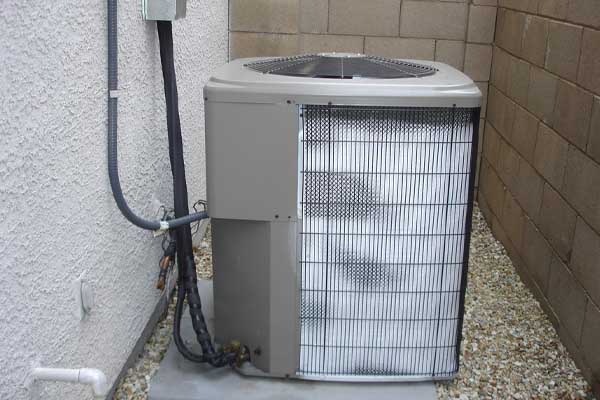
Air conditioners keep your indoor temperature at a comfortable level during the summer. However, frozen air conditioners are a common issue many homeowners encounter. This lowers the efficiency of the unit and can lead to severe damage if it isn’t addressed properly. Luckily, you can prevent a frozen AC unit with the help of a few preventative measures. Keep reading to learn some tips on air conditioner maintenance and how you can help it run smoothly throughout the summer.
Steps to Follow When Your Air Conditioner Freezes
You should act quickly if your air conditioner freezes. Here are several simple tips on how you can address this issue:
Related Article: 7 Steps On How To Unfreeze Your AC Coils
Check for Refrigerant Leaks
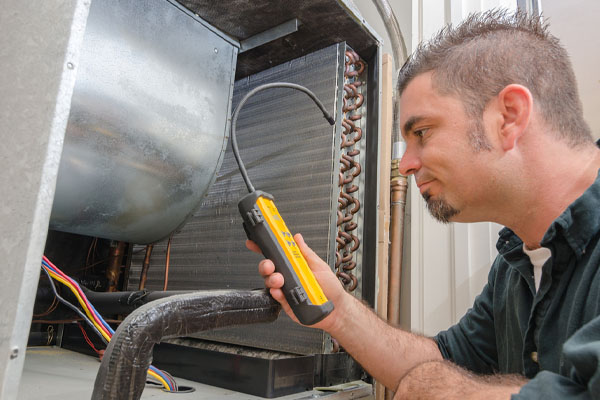
A frozen AC unit can happen when there are low refrigerant levels. If your AC has a refrigerant leak, call an HVAC technician to check it immediately so no further damage happens. The refrigerant is a crucial component of your air conditioner. It absorbs the heat from the air inside your home and releases it outdoors. Low refrigerant levels mean the air conditioner works harder to reach the set temperature, which, in turn, means reduced efficiency, causing your energy bills to spike.
Related Article: The Importance Of Home Air Sealing Your Home On Energy Costs
Refrigerant Leak Causes
Damaged or worn-out refrigerant lines, compressors, evaporator coils, or other components can result in refrigerant leaks. An HVAC technician has the specialized equipment and expertise to find refrigerant leaks. Neglecting refrigerant leaks can result in permanent compressor damage. Keep in mind that this component is extremely costly to replace.
How To Prevent Air Conditioner Refrigerant Leaks
Book maintenance checks regularly to prevent refrigerant leaks. These air conditioner checkups include assessing the refrigerant levels and finding potential issues before they result in significant damage. When a professional services your air conditioner, you can help prolong its lifespan and ensure effective and efficient operations. Therefore, your home stays comfortable during the summer months.
Related Article: 10 Reasons Why Your AC Unit Isn’t Blowing Cool Air
Check and Replace HVAC Air Filters Regularly
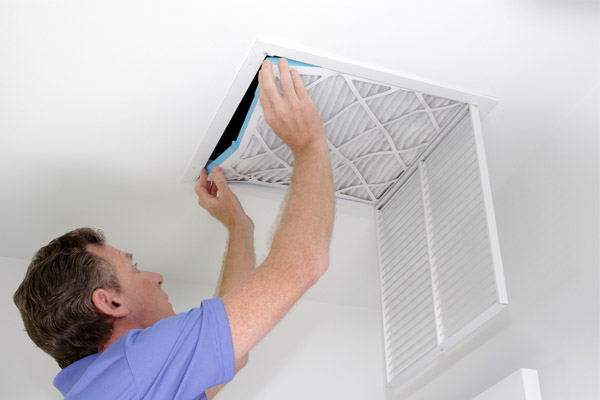
It is crucial to check and replace the HVAC air filters regularly because it helps ensure that your system runs efficiently and your home has good indoor air quality. Air filters catch pollutants like dust and dirt, so they don’t mix with the air inside your home and potentially aggravate allergies and trigger respiratory problems. However, air filters get dirty as time passes. The foreign particles can clog it and restrict airflow, pushing your air conditioner to work harder to distribute conditioned air throughout your home. This burden causes lower efficiency and higher energy expenses. Moreover, neglecting to replace your air filters can eventually cause the system to break down.
How Often Should I Replace My HVAC Air Filter?
Always check and replace the air filters every one to three months, per the conditions in your home and the filter type. For instance, you need to replace the filters more often if you have pets, family members with allergies, or smokers.
Air filter replacement is an easy task most homeowners can accomplish. Find the air filter compartment, remove the dirty filter, and change it with a new filter that’s the same type and size. Having an HVAC professional service your system at least once a year is also recommended. This service has an HVAC technician checking the filter, cleaning the system, and ensuring all components work efficiently.
Regular checks and air filter replacements guarantee a system that operates efficiently and can certainly prevent a frozen AC unit. It also helps prolong its service life and maintain good indoor air quality.
Related Article: 7 Must-Have Accessories to Improve HVAC Performance
Maintain Air Conditioner Blower Fans
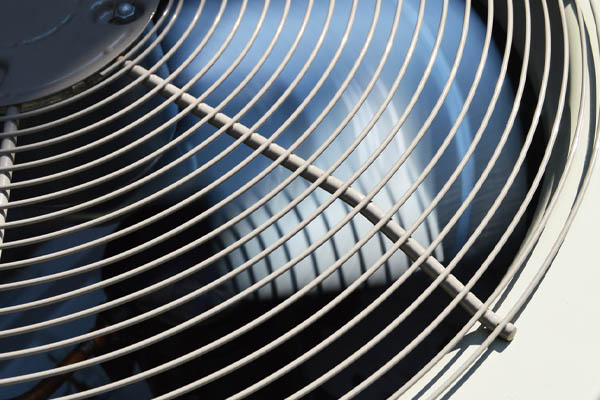
Blower fans circulate the air throughout your home. An improperly working blower fan means your system cannot distribute conditioned air effectively. As a result, there will be discomfort around your home, decreased system efficiency, and high energy costs. Ensure the blower fan works properly by checking that it runs while your system is on. Check if it’s emitting unusual noises, and hire an HVAC technician to examine it during maintenance visits. A faulty blower fan can also strain other HVAC components, resulting in more significant problems if left unchecked.
Keep Condensate Drain Lines Clear
A clear condensate drain line is crucial for your system to operate efficiently and prevent potential water damage to your home. The condensate drain line removes the water created as warm air goes over the cold evaporator coil in your HVAC unit. Mold, algae, and debris can build up in the drain line over time. This accumulation can clog it, leading to water backups and possible water damage in your home.
Related Article: How HVAC Comfort Zones Cut Energy Costs
How To Avoid A Clogged Condensate Drain Line
Prevent the drain condensate line from clogging by checking it regularly, particularly during the hot months. Remove foreign debris or particle accumulation in the drain line using a wet or dry vacuum or a pipe cleaner. Ensure that it is linked properly and flowing outside or to a drain.
If you suspect the drain line is clogged or notice water backup, call an HVAC professional to diagnose and repair the problem. Make sure the condensate drain line is clear to prevent any potential water damage. This also makes sure that the system operates efficiently.
Check Your Air Conditioner Vents
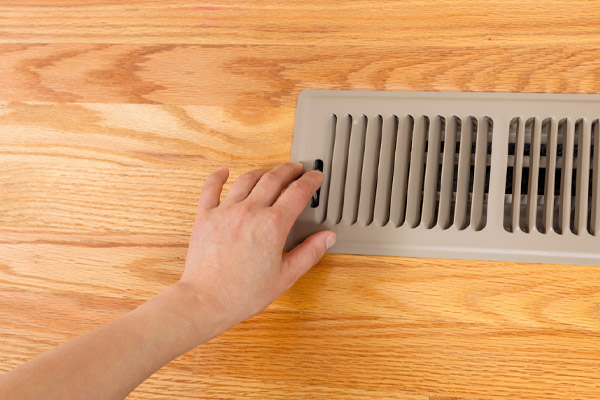
It is essential for the vents to stay free from dust and debris. This way, excellent indoor air quality is maintained, and the system runs efficiently. The vents can clog as time passes. An accumulation of pet hair, dust, and other particles can restrict airflow and force your air conditioner to work harder than necessary. This can cause decreased efficiency, increased energy expenses, and potential breakdowns. Prevent this from happening by vacuuming and dusting your vents regularly. You should also ensure that no furniture or other objects are blocking the vents. Maintaining clean and clear vents helps improve the air quality in your home while ensuring that your HVAC unit operates smoothly.
Conclusion
Ensuring that your air conditioner doesn’t freeze is essential in maintaining its efficiency and extending its lifespan. The tips above can help your system have a smooth and effective operation. It is also crucial to call for professional help when required. For instance, have an HVAC technician check the refrigerant levels or clean the blower fan. Do not neglect system maintenance, as it can cause lower indoor air quality, increased energy bills, and potential breakdowns. Do the necessary tasks to prevent your air conditioning system from freezing and keep your home comfortable throughout the summer.
Related Article: Key Differences Between HEPA & MERV Filters
Call Point Bay Fuel For All Your HVAC Requirements

Point Bay Fuel provides high-quality HVAC services in Ocean County and Monmouth County, New Jersey. Our professionally certified technicians specialize in top-notch heating and cooling services, such as boiler replacements, AC maintenance, mini-split installation, and more. All our techs are experienced, skilled, and knowledgeable in servicing your HVAC system correctly.
Our company guarantees to offer quality and cost-effective services. Our maintenance services can help you achieve better comfort, energy efficiency, and lower cooling bills. If you need an HVAC repair or replacement system, we can suggest the best solutions for your home within your home. Call us today and book a service appointment. We guarantee all our services. Point Bay Fuel offers free, in-home estimates.
Contact us now by calling (732) 349-5059 to speak to one of our home comfort specialists! Click the link to view our service area.
The post How To Prevent Your Air Conditioner From Freezing Up appeared first on Point Bay Fuel.

